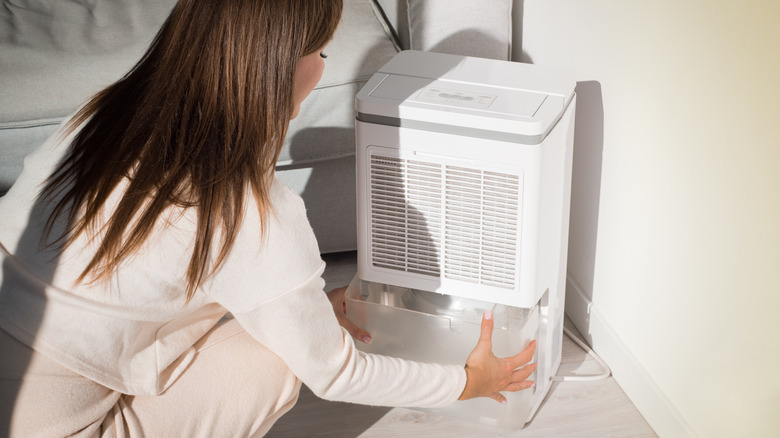Never Pour Dehumidifier Water Down The Drain Again With This Brilliant Hack
Fresh water is becoming scarce all over the world, so the more water we can save, the more we can help preserve what's left. While it may seem like a drop in the ocean, taking steps to conserve water in your home will benefit the planet. TikTok user @tipsandtrickswithq showed a superb way of recycling water by filling a watering can with dehumidifier water and using it on her plants instead of pouring it down the drain. Most plant owners use drinking water to hydrate their plants, but it's a waste of clean, fresh water when there are alternatives to use.
Dehumidifiers are often used during scorching weather — they remove moisture from the air to make the space feel cooler. The water that enters the dehumidifier travels into its reservoir, where the air is then released through warm coils and pushed back out to the room, making it colder. However, the water in the reservoir isn't filtered, so it's filled with microorganisms, mold, and dust from the air inside the rooms. While it's unsafe to consume as a human, your plants can benefit from the dehumidifier water, and you save fresh water for yourself.
Why dehumidifier water is suitable for plants
The dehumidifier water is a type of gray water, meaning it's clean wastewater that's been used for something. Most gray water comes from showers, sinks, washing machines, etc., without fecal contamination. While it is contaminated by bacteria, mold, and mildew, which humans shouldn't consume, it's safe for houseplants. Using antibacterial soil for your plants will also help to fight off the bacteria in the gray water, making it harmless for the plants to consume. House Fresh's research on pH levels found in tap water, filtered water, and dehumidifier water found that dehumidifier water had more neutral pH levels, providing plants with the necessary nutrients.
In addition, gray water gets stripped of minerals like calcium and magnesium, and your plant won't receive those nutrients. Although, it won't be exposed to chlorine found in tap water, which is toxic to plants. Simply remove your dehumidifier's water tank, pour the water into a watering can, and spread it over your plants and flower beds.
You should avoid watering edible plants and herbs, such as vegetable gardens and leafy greens, with dehumidifier water because of cross-contamination. Since the gray water has bacteria and mold, you don't want that contaminating your food. In addition, there are traces of lead in dehumidifier water, which could be dangerous to consume if you water your edible plants. Instead, stick to non-edible plants, like orchids, hydrangeas, tulips, etc. — they'll enjoy the water much more.
